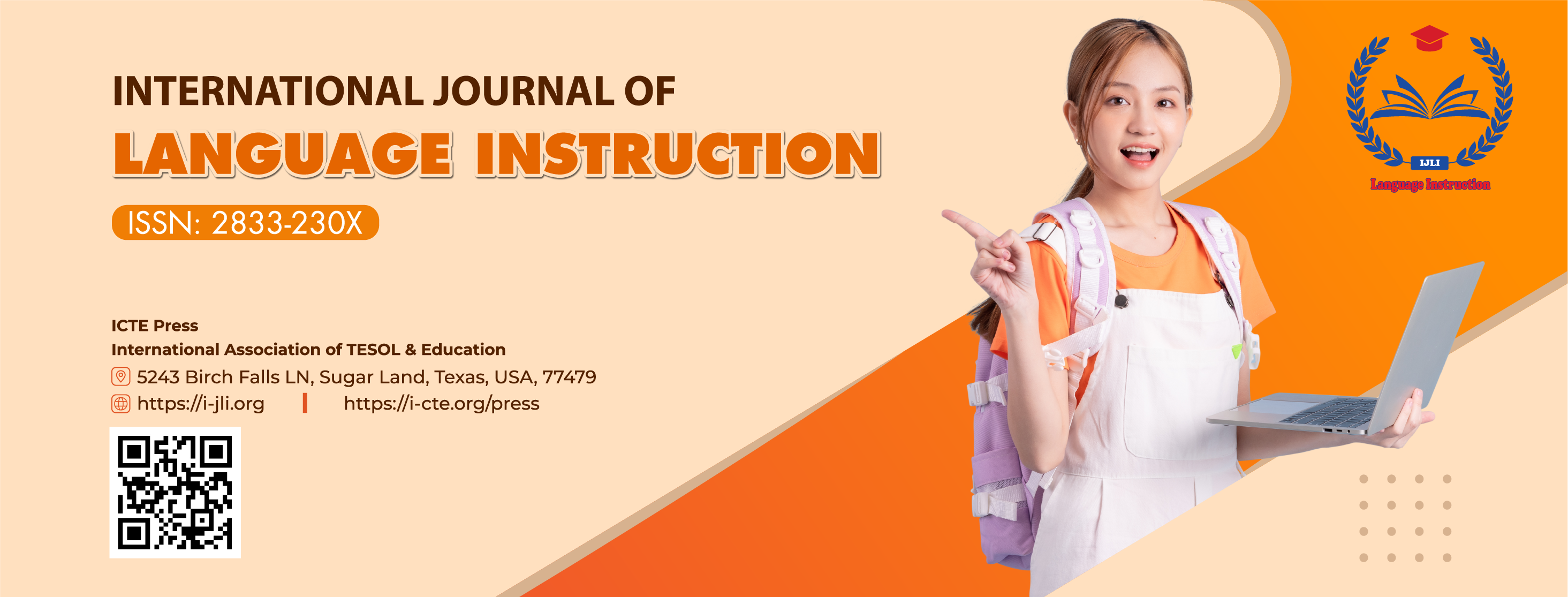Teachers’ Strategies in Teaching Reading Comprehension
DOI:
https://doi.org/10.54855/ijli.22113Keywords:
Teacher’s strategies, reading comprehension, affecting factorsAbstract
Previous studies have effectively demonstrated that teaching techniques for reading comprehension are crucial to the learning process and may have an impact on students' reading comprehension. To further investigate teachers' strategies in teaching reading comprehension and how their students reacted to such strategies at Hau Giang Community College. The current study adopted a qualitative study design with observation and interviews. The study's participants were taken from five English teachers who teach in HGCC with different experiences and degrees of background knowledge and 31 students in Pharmacy A. According to this study, teachers have been using techniques including questioning, predicting, retelling, and picturing to promote reading comprehension. Additionally, it showed that the majority of the students gave enough feedback on the tactics used by their teachers. According to these findings, teachers should inform students of the instructions before they read the text and utilize tactics for teaching reading comprehension in line with each student's level of ability and personality to encourage greater engagement.
References
Antoni, N. (2010). Exploring EFL teachers’ strategies in teaching reading comprehension. Jurnal Penelitian Pendidikan, 11(2), 39–51.
Armbruster, B. B., Anderson, T. H., & Ostertag, J. (1987). Does text structure/summarization instruction facilitate learning from expository text? Reading Research Quarterly, 331–346.
Brown, H. D. (2001). Teaching by participles an interactive approach to language Pedagogy Strategies of Reading. Longman: A Person Education Company
Brown, H. D. (2004). Teaching by Principles: Language Assessment.
Clarke, P. J., Truelove, E., Hulme, C., & Snowling, M. J. (2013). Developing reading comprehension. John Wiley & Sons.
Cohen, L., & Manion, L. (1994). Research methods in education 4th edition Routledge. London: Routledge
Duke, N. K., & Pearson, P. D. (2009). Effective practices for developing reading comprehension. Journal of Education, 189(1–2), 107–122.
Gambrell, L. B., Koskinen, P. S., & Kapinus, B. A. (1991). Retelling and the reading comprehension of proficient and less-proficient readers. The Journal of Educational Research, 84(6), 356–362.
Gibbons, P. (2002). Scaffolding language, scaffolding learning. Heinemann Portsmouth, NH.
Grabe, W. P., & Stoller, F. L. (2013). Teaching and researching: Reading. Routledge.
Grellet, F. (1981). Developing reading skill. London: Cambridge.
Harmer, J. (2007). How to teach English-New edition. England: Longman.
Huynh, D. P. (2022). Extensive Reading on Postgraduate Students’ Perceptions and Its Effects on Reading Comprehension. International Journal of TESOL & Education, 2(4), 32–47. https://doi.org/10.54855/ijte.22243
Klingner, J. K., Urbach, J., Golos, D., Brownell, M., & Menon, S. (2010). Teaching reading in the 21st century: A glimpse at how special education teachers promote reading comprehension. Learning Disability Quarterly, 33(2), 59–74.
Koda, K. (2007). Reading and language learning: Crosslinguistic constraints on second language reading development. Language Learning.
McCormick, S., & Cooper, J. O. (1991). Can SQ3r facilitate secondary learning disabled students’literal comprehension of expository test? Three experiments. Reading Psychology: An International Quarterly, 12(3), 239–271.
McNamara, D. S., & Magliano, J. (2009). Toward a comprehensive model of comprehension. Psychology of Learning and Motivation, 51, 297–384.
Meniado, J. C. (2016). Metacognitive Reading Strategies, Motivation, and Reading Comprehension Performance of Saudi EFL Students. English Language Teaching, 9(3), 117–129.
Nguyen, H. T. (2007). Educating Vietnamese American Students. Multicultural Education, 15(1), 23–26.
Nurdianingsih, F. (2021). Teachers’ strategies in teaching reading comprehension. Professional Journal of English Education, 4(2), 285–289.
Pham, U. M. (2021). The Effects of Reading Habits on Reading Comprehension. International Journal of TESOL & Education, 1(2), 15-44. Retrieved from http://eoi.citefactor.org/10.11250/ijte.01.02.002
Pichert, J. W., & Anderson, R. C. (1977). Taking different perspectives on a story. Journal of Educational Psychology, 69(4), 309.
Rumelhart, D. E., & McClelland, J. L. (1981). Interactive processing through spreading activation. In Interactive processes in reading (pp. 37–60). Lawrence Erlbaum.
Snow, C., & RAND Reading Study Group. (2002). Reading for understanding: Toward an R&D program in reading comprehension. Rand Corporation.
Trehearne, M., & Doctorow, R. (2005). Reading comprehension: Strategies that work. Comprehensive Literacy Resource: Grade 3-6 (Chapter 2).
Van Dijk, T. A., & Kintsch, W. (1983). Strategies of discourse comprehension. New York.
Wallace, C. (1992). Critical literacy awareness in the EFL classroom. Critical Language Awareness, 59–92.
Wibowo, Y., Syafrizal, S., & Syafryadin, S. (2020). An analysis of English teachers’ strategies in teaching reading comprehension. JALL (Journal of Applied Linguistics and Literacy), 4(1), 20–27.
Downloads
Published
Issue
Section
License
Copyright (c) 2022 Nguyen Thi Lan Phuong

This work is licensed under a Creative Commons Attribution-NonCommercial 4.0 International License.
The copyright of all articles published in the International Journal of Language Instruction (ijli) remains with the Authors, i.e. Authors retain full ownership of their article. Permitted third-party reuse of the open access articles is defined by the applicable Creative Commons (CC) end-user license which is accepted by the Authors upon submission of their paper. All articles in the ijli are published under the CC BY-NC 4.0 license, meaning that end users can freely share an article (i.e. copy and redistribute the material in any medium or format) and adapt it (i.e. remix, transform and build upon the material) on the condition that proper attribution is given (i.e. appropriate credit, a link to the applicable license and an indication if any changes were made; all in such a way that does not suggest that the licensor endorses the user or the use) and the material is only used for non-commercial purposes.
Authors are able to enter into separate, additional contractual arrangements for the non-exclusive distribution of the journal's published version of the work (e.g., post it to an institutional repository, in a journal or publish it in a book), with an acknowledgment of its initial publication in this journal.











